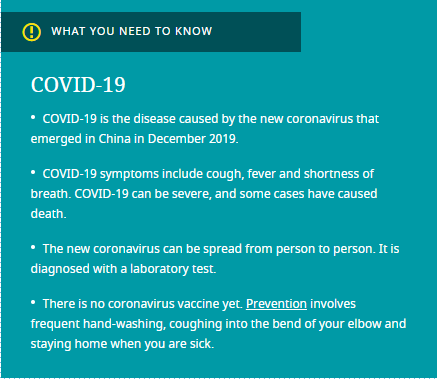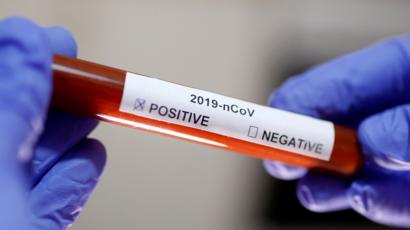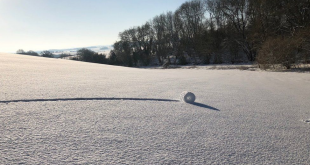
How is COVID-19 spread?
COVID-19 can be passed from person to person through droplets from coughs and sneezes. COVID-19 has been detected in people all over the world, and is considered a pandemic.
The spread of this new coronavirus is being monitored by the Centers for Disease Control (CDC), the World Health Organization and health organizations.
How did this new coronavirus spread to humans?
COVID-19 appeared in Wuhan, a city in China, in December 2019. Although health officials are still tracing the exact source of this new coronavirus, early hypotheses thought it may be linked to a seafood market in Wuhan, China. Some people who visited the market developed viral pneumonia caused by the new coronavirus. A study that came out on Jan. 25, 2020, notes that the individual with the first reported case became ill on Dec. 1, 2019, and had no link to the seafood market. Investigations are ongoing as to how this virus originated and spread.
What is the incubation period for COVID-19?
It appears that symptoms are showing up in people within 14 days of exposure to the virus.
What are symptoms of COVID-19?
COVID-19 symptoms include:
- Cough
- Fever
- Shortness of breath
In rare cases, COVID-19 can lead to severe respiratory problems, kidney failure or death.
If you have a fever or any kind of respiratory difficulty such as coughing or shortness of breath, call your doctor or a health care provider and explain your symptoms over the phone before going to the doctor’s office, urgent care facility or emergency room. Here are suggestions if you feel sick and are concerned you might have COVID-19.
If you have a medical emergency such as severe shortness of breath, call 911 and let them know about your symptoms.
How is COVID-19 diagnosed?
Diagnosis may be difficult with only a physical exam because mild cases of COVID-19 may appear similar to the flu or a bad cold. A laboratory test can confirm the diagnosis.
How is COVID-19 treated?
As of now, there is not a specific treatment for the virus. People who become sick from COVID-19 should be treated with supportive measures: those that relieve symptoms. For severe cases, there may be additional options for treatment, including research drugs and therapeutics.
Does COVID-19 cause death?
As of Mar. 21, 2020, 11,906 deaths have been attributed to COVID-19. However, 89,899 people have recovered from the illness.
Is this coronavirus different from SARS?
SARS stands for severe acute respiratory syndrome. In 2003, an outbreak of SARS started in China and spread to other countries before ending in 2004. The virus that causes COVID-19 is similar to the one that caused the 2003 SARS outbreak: both are types of coronaviruses. Much is still unknown, but COVID-19 seems to spread faster than the 2003 SARS and also may cause less severe illness.
How do you protect yourself from this coronavirus?
It’s crucial to practice good hygiene, respiratory etiquette and social distancing. Read more about ways to protect yourself.

About Coronaviruses
- Coronaviruses are common in different animals. Rarely, an animal coronavirus can infect humans.
- There are many different kinds of coronaviruses. Some of them can cause colds or other mild respiratory (nose, throat, lung) illnesses.
- Other coronaviruses can cause more serious diseases, including severe acute respiratory syndrome (SARS) and Middle East respiratory syndrome (MERS).
- Coronaviruses are named for their appearance: Under the microscope, the viruses look like they are covered with pointed structures that surround them like a corona, or crown.
Outbreak 💡 (epidemic, a sudden increase)
Respiratory 💡 (relating to respiration; breathing)
Illness 💡 (a bodily disorder, disease or physical sickness)
Cough 💡 (a sudden, usually noisy expulsion of air from the lungs, often involuntary)
Sneeze 💡 (an emission of wind audibly by the nose)
To detect 💡 (to discover, find out, lay open, reveal)
Pneumonia 💡 (an acute or chronic inflammation of the lungs caused by viruses)
Individual 💡 (single, distinct, sole of a particular person, a member of a population)
Investigation 💡 (a detailed examination, the process of research)
Incubation 💡 (the development of a disease from its causes, period between infection and clinical manifestation of disease)
Exposure 💡 (the condition of being exposed, uncovered, or unprotected)
Facility 💡 (easiness, services and space and equipment provided for a particular purpose)
Severe 💡 (strict, harsh, intense)
Diagnosis 💡 (determination of the distinctive nature of a disease)
Therapeutic 💡 (relating to the art or act of curing)
Crucial 💡 (important)
Rarely 💡 (not often, seldom)
To infect 💡 (to bring into contact with a substance that can cause illness)
Serious 💡 (critical)
Crown 💡 (wreath)
 Learn English Fondly Learn English Fondly,Easily,Quickly
Learn English Fondly Learn English Fondly,Easily,Quickly
